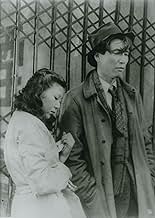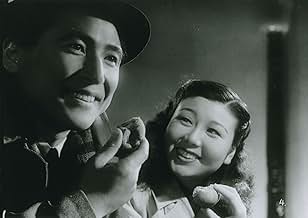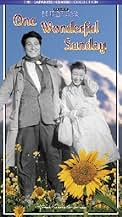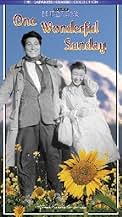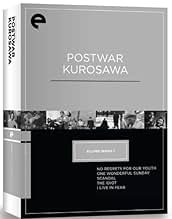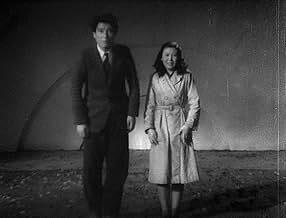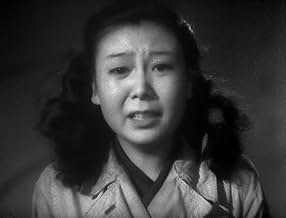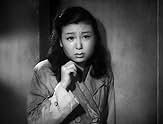IMDb-BEWERTUNG
7,2/10
3983
IHRE BEWERTUNG
Füge eine Handlung in deiner Sprache hinzuDuring a Sunday trip into war-ravaged Tokyo, despairing Yuzo and optimistic Masako look for work and lodging, as well as affordable entertainments to pass the time.During a Sunday trip into war-ravaged Tokyo, despairing Yuzo and optimistic Masako look for work and lodging, as well as affordable entertainments to pass the time.During a Sunday trip into war-ravaged Tokyo, despairing Yuzo and optimistic Masako look for work and lodging, as well as affordable entertainments to pass the time.
- Regie
- Drehbuch
- Hauptbesetzung
- Auszeichnungen
- 2 wins total
Sachio Sakai
- Shady Ticket Man
- (Nicht genannt)
Empfohlene Bewertungen
Akira Kurosawa's movies have a whole range of themes, be they set in contemporary or in historical eras. To name a few: the chasm between the rich and the poor, between the strong and the weak, between the courageous and the cowards, between the powerful and their foot folk, between the honest and the deceitful, between the clever and the idiots, between the sincere and the dishonest, and also, importantly, between war (destruction and loss) and peace (happiness).
In this movie, made just after WW II, he depicts the struggle for life of 'poor lovers', whose dreams were shattered by the war. Japan is in dire straits: no jobs, and, if you have a job, bad salaries; high rents for decent shelters and huge inflation. 'Free markets' are controlled by 'black' merchants and their thugs. There is still an upper class, which looks with contempt on those without money, their former foot folk. The girl remains optimistic, but her lover is deeply depressed.
Akira Kurosawa made some very risky shots on the music of F. Schubert's unfinished symphony. But, he had the mastery to create the perfect mood. Not to be missed and certainly not by A. Kurosawa fans.
In this movie, made just after WW II, he depicts the struggle for life of 'poor lovers', whose dreams were shattered by the war. Japan is in dire straits: no jobs, and, if you have a job, bad salaries; high rents for decent shelters and huge inflation. 'Free markets' are controlled by 'black' merchants and their thugs. There is still an upper class, which looks with contempt on those without money, their former foot folk. The girl remains optimistic, but her lover is deeply depressed.
Akira Kurosawa made some very risky shots on the music of F. Schubert's unfinished symphony. But, he had the mastery to create the perfect mood. Not to be missed and certainly not by A. Kurosawa fans.
This film provides an interesting counterpoint to other Kurosawa films. Its portrayal of post-war Japan recalls Stray Dog, but the poverty and sleaziness in this case are used as the background for a romance between two very attractive young people, who have a Sunday date, but only 35 yen to spend. Yet there is not the gloom of Lower Depths. Both have jobs and we see his minimally decent rental room. The title seems throughout the film to be rather ironic, since most of the situations they encounter, such as being cheated at a snack bar, are far from wonderful. However, Kurosawa puts a positive spin at the conclusion. I agree with another reviewer that the device of having the girl speak to the audience, seeking our sympathy for young couples without money, who wish to marry, is a very awkward device that distracts from our interest in the relationship. However, I disagree with another reviewer who describes the ending as corny: we've all heard of Capra-corny. This film does not come up to Capra's level, but it is reminiscent of his human interest. It seemed to me that the closing device of the girl's making a date for the next Sunday works very well. Every film needs closure, and this one does not deal in high drama at any point, so a highly dramatic climax would not be appropriate. The viewer who wants that should go to Ran or Kagemusha. In my view, the early Kurosawa films showed him how to develop human relationships: a gift that later would be present in the samurai films, and would make them much more than action epics.
ONE WONDERFUL SUNDAY (1947) has a simple little plot. A young Tokyo couple have almost no money to spend on their only day available for a date. It isn't long until the money is gone, as well as the young man's spirit. The ending is uncomfortably corny, you will squirm in your seat. There is signs of Akira Kurosawa becoming a great director. He makes us pay attention to the decreasing amount of money (much like he made us pay attention to the number of slain bandits in SEVEN SAMURAI, and his stab at Frank Capra style humor is pretty good. A must see for the student of this great director.
Not one of my favourites from Akira Kurosawa- hard because he is one of cinema's greatest directors with a lot of great films- but when talking about his most underrated films One Wonderful Sunday would be a strong contender. A few scenes go on for a little too long, other than that there was not really anything that came across as wrong. Admittedly the ending is an odd one but also amusing and affecting, one of those endings that wasn't a problem for me but one also that will work for some and not so much for others. While not the most audacious visually of Kurosawa's films One Wonderful Sunday is still beautifully shot, going for the simple (but not simplistic) approach rather than one that, considering the tone of the film, could fall into overblown-style territory. Kurosawa's direction for so early on in his career directs more than capably, One Wonderful Sunday is different in a way for him- one of his most simple films for sure- but there is clear evidence of knowing how to direct with style and he seems to be very comfortable with it. The music when used fits very well and will please any listener. The writing is amusing and uplifting while also peaceful and poignant, and with the story there is a playful tone in places, a dream-like one in others and then there are a lot of scenes where it is endearingly sweet and has a lot of emotional impact. There is poverty as a theme but it's not used heavy-handedly at all. The acting is very good if not among the greatest performances of a Kurosawa film. Then again, you shouldn't expect that, and that is the same with the film too, even if it isn't one of Kurosawa's finest it does deserve to be judged on its own merits of which One Wonderful Sunday has a great many. Coming back to the acting, Chieko Nakakita is captivating right from her appearance to how she grabs the attention of the viewer even in the simplest of things. Overall, a beautiful film and deserves to be better known and seen much more than it is at the moment. 9/10 Bethany Cox
With this warm and uplifting film, the effect Kurosawa achieves is in the simplicity. The story is threadbare. Two lovebirds try to spend a Sunday together in post-war Tokyo and enjoy themselves with only 35 yen in their pockets. Kurosawa never ceases to amaze me because of his incredibly acute comprehension of the visual effects of a story. The simpler the story is, the more it becomes simply a day in their lives. The more it becomes a day in the life, the more upsetting we find the challenges facing them because of the Occupation and the crumbling economy at the time.
It's almost like a lightweight version of The Lost Weekend. There are no debilitating problems like alcoholism or writer's block. There are just obstructions and inconveniences with which the characters can either roll or stew around.
One Wonderful Sunday is a beautiful slice of life from a time that could be many different times in many different places. It's a peaceful movie about the peace that is always there for a given person, their journey being to find it. I have rarely seen a sequence so beautifully crafted on film as the two lovers in the empty, decaying concrete exterior auditorium, where one resolves to create the music they have been struggling to hear. There is hardly a handful of filmmakers living today that would think of such a thing. Kurosawa may have had the clearest, purest understanding of cinema out of any filmmaker.
It's almost like a lightweight version of The Lost Weekend. There are no debilitating problems like alcoholism or writer's block. There are just obstructions and inconveniences with which the characters can either roll or stew around.
One Wonderful Sunday is a beautiful slice of life from a time that could be many different times in many different places. It's a peaceful movie about the peace that is always there for a given person, their journey being to find it. I have rarely seen a sequence so beautifully crafted on film as the two lovers in the empty, decaying concrete exterior auditorium, where one resolves to create the music they have been struggling to hear. There is hardly a handful of filmmakers living today that would think of such a thing. Kurosawa may have had the clearest, purest understanding of cinema out of any filmmaker.
Wusstest du schon
- WissenswertesThe film's climax was considered a failure in both Japan and the U.S. as audiences refused to clap for the lead characters, though supposedly it went over very well in France, gaining much audience participation.
- PatzerA clock is seen above a shop in the baseball scene. The time showing is 5:05, but it is still only morning.
- SoundtracksLa Cumparsita
Composed by Gerardo Matos Rodríguez
Top-Auswahl
Melde dich zum Bewerten an und greife auf die Watchlist für personalisierte Empfehlungen zu.
- How long is One Wonderful Sunday?Powered by Alexa
Details
- Erscheinungsdatum
- Herkunftsland
- Sprache
- Auch bekannt als
- One Wonderful Sunday
- Drehorte
- Toho Studios, Tokio, Japan(Studio)
- Produktionsfirma
- Weitere beteiligte Unternehmen bei IMDbPro anzeigen
- Laufzeit
- 1 Std. 48 Min.(108 min)
- Farbe
- Sound-Mix
- Seitenverhältnis
- 1.37 : 1
Zu dieser Seite beitragen
Bearbeitung vorschlagen oder fehlenden Inhalt hinzufügen

